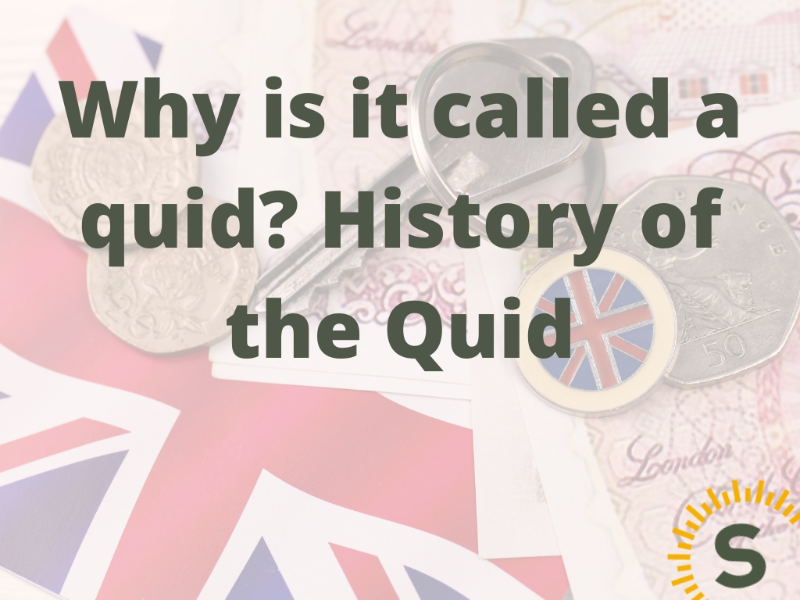
Have you ever wondered why the British pound is often referred to as a "quid"?
The term may seem peculiar to non-Brits, but it holds a fascinating history. In this article, we will delve into the origins of the word "quid" and explore why it became a popular slang for the sterling currency.
Brits say "quid" due to its origins, possibly rooted in "quid pro quo" or linked to Quidhampton, a village in England with a Royal Mint paper mill. Its simplicity and distinctiveness made it popular, and it became synonymous with the pound sterling, gaining cultural significance over centuries.
The term "quid" is still commonly used in the United Kingdom as slang for the British pound. It's a colloquial term that people use in everyday conversations to refer to the currency.
The word "quid" is believed to have two origins. Both have emerged in the late 17th century, the fist belief is that it derived from the Latin term "quid pro quo," meaning "something for something." It was originally used as a slang term by street vendors who sold small, inexpensive items. These vendors would often use the phrase "quid pro quo" to refer to their trade, as they would exchange goods for money. Over time, the term "quid" started to be used as a colloquial term for one pound sterling.
The second belief is that the term "quid" may find its roots in Quidhampton, a village in Wiltshire, England, which once housed a Royal Mint paper mill. It's possible that any paper money produced there came to be known as a "quid." The pound sterling boasts a remarkable history, spanning over 12 centuries, making it the world's oldest continuously used currency.
But why did this particular term stick? One theory suggests that the word's simplicity and ease of pronunciation contributed to its popularity among the working class. Unlike other slang terms for money, such as "bob" or "shilling," "quid" had a straightforward and distinctive sound that made it easy to remember and use in everyday conversations. Another theory proposes that "quid" was used to distinguish the pound sterling from other European currencies, which had different names.
As the term "quid" gained popularity, it became widely used in various contexts. It was commonly used in the British gambling scene, where players would refer to their bets in pounds as "quid." The term soon spread beyond the gambling world and became a part of everyday language. People would use it when talking about prices, salaries, or any financial transactions involving the pound sterling.
During the Victorian era, "quid" became even more deeply embedded in British culture. It was not only used in spoken language but also appeared in literature and newspapers of the time. The term was often used by authors to create a sense of authenticity and to capture the essence of British society. It became a symbol of the nation's identity and was embraced by all social classes.
Throughout the years, the term "quid" has undergone some changes in usage and meaning. In the 19th century, "quid" was often used as a generic term for money, not limited to the pound sterling. However, as the British currency system evolved, the term became synonymous with the pound and lost its broader meaning.
In the early 20th century, "quid" faced competition from other slang terms for the pound, such as "nicker" or "sovereign." However, none of these terms managed to surpass the popularity and widespread usage of "quid." It remained the go-to slang term for the pound sterling, solidifying its place in British vocabulary.
The term "quid" holds significant cultural significance in British society. It has become an integral part of the nation's identity and is recognised by people of all ages and backgrounds. The use of "quid" in everyday language creates a sense of familiarity and camaraderie among Britons, as it is a shared linguistic heritage.
Furthermore, the term "quid" has found its way into various aspects of British popular culture. It has been referenced in literature, films, and music. The slang term is often used to evoke a sense of nostalgia and to paint a vivid picture of British life and traditions.
Interestingly, the term "quid" is not unique to the English language. Similar slang terms are used in other languages and cultures to refer to their respective currencies. For example, in Australia, the dollar is sometimes referred to as a "buck." In the United States, the dollar is commonly called a "buck" as well. These terms share the same colloquial nature as "quid" and highlight the universal appeal and creativity of slang language.
The term "quid" has made its mark in literature and popular culture. It has been referenced in numerous works, both classic and contemporary. One of the most iconic instances is found in Charles Dickens' novel "Oliver Twist," where the character Fagin uses the term "quid" to refer to money. This usage reflects the association of "quid" with the underbelly of society and the world of crime.
In modern popular culture, the term "quid" continues to be used in various forms of media. It has been featured in songs, movies, and television shows, often used to add authenticity to British characters or settings. The term's widespread recognition makes it a powerful tool for creators to establish a sense of time and place.
In today's digital age, the term "quid" remains a popular slang term for the British pound. It is frequently used in informal conversations, online forums, and social media. The term's enduring presence reflects its resilience and ability to adapt to changing times. Despite the emergence of digital payment methods, the term "quid" continues to hold its place in British vocabulary.
20 quid is equal to 20 pounds. "Quid" is a slang term commonly used in the United Kingdom to refer to the British pound, so when someone says "20 quid," they mean 20 units of the currency.
The term "quid" has a rich and fascinating history that spans centuries. From its humble origins as a slang term for street vendors to its widespread usage as a colloquial expression for the British pound, "quid" has become an integral part of British culture and identity.
Its enduring popularity can be attributed to its simplicity, ease of pronunciation, and association with the pound sterling. The term's usage in literature, popular culture, and everyday conversations has solidified its place in the British vocabulary.
So, the next time you hear someone refer to the British pound as a "quid," remember the intriguing history behind this seemingly simple slang term. It is a testament to the power of language to evolve and shape our perception of the world around us.

Stuart is an expert in Property, Money, Banking & Finance, having worked in retail and investment banking for 10+ years before founding Sunny Avenue. Stuart has spent his career studying finance. He holds qualifications in financial studies, mortgage advice & practice, banking operations, dealing & financial markets, derivatives, securities & investments.





Our website offers information about financial products such as investing, savings, equity release, mortgages, and insurance. None of the information on Sunny Avenue constitutes personal advice. Sunny Avenue does not offer any of these services directly and we only act as a directory service to connect you to the experts. If you require further information to proceed you will need to request advice, for example from the financial advisers listed. If you decide to invest, read the important investment notes provided first, decide how to proceed on your own basis, and remember that investments can go up and down in value, so you could get back less than you put in.
Think carefully before securing debts against your home. A mortgage is a loan secured on your home, which you could lose if you do not keep up your mortgage payments. Check that any mortgage will meet your needs if you want to move or sell your home or you want your family to inherit it. If you are in any doubt, seek independent advice.